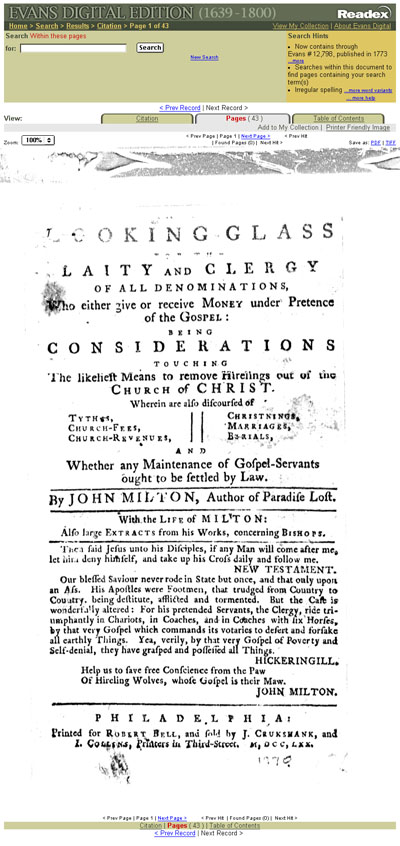An MRI of Early America

Review of Evans Digital Edition, 1639-1800, produced and distributed by Readex/NewsBank, Inc., in cooperation with the American Antiquarian Society. Chester, Vt., 2003. Introduction | Cathy N. Davidson | Jay Fliegelman The digitalized Evans provides the scholar of early America with a tool as revelatory as the medical MRI. The slightest browsing provides a provocation to original thought. Searches can be limited by date or targeted by means of a wonderful array of pre-selected and assembled categories—captivity narratives, economics and trade, law and crime, facetiae (humor and pornography), Welsh texts, Dutch texts, subscribers lists, booksellers catalogues etc. One can search titles or full texts. But the real value of the search engine is in full searches precisely because such searches are inherently interdisciplinary. Key word, phrase, or proximity searches allow one to see the myriad of contexts in which a key term appears, without prejudging that term as fundamentally legal, social, theological, economic, or otherwise discipline specific. Thus a search potentially allows one to see the archeological connections, the larger discourses or metaphorics that undergird seemingly disparate texts. Scarlet woman makes several appearances in surprising locations as does nation, jollity, independence, plot, romantic, and paths of virtue. The micro discovery may carry macro explanatory power. A user comes to appreciate the dialectical character of words (as in the five or six different meanings of the word character or the doubleness of state as condition and state as geographical entity). Searches, say, for Livy force the user beyond the simplistic category of influence or even authorization, to see how Livy is deployed in one text versus another and to what ends. Astrologymakes so many appearances (within and beyond almanacs) as to suggest it is a counter discourse to providentialism. Revelations 12offers a proof text to quite different scenarios of millennialism and catastrophism. Latin searches make possible interesting etymological discoveries. Merce or price pushes both in the direction of mercy (Christ pays the price for all) and merchant (as in the buried pun in Shakespeare’s title). All this is to say that all search engines remind us that texts are the strategic collocation of words. In that sense the Evans Digital favors the close attention to specific language, a level of critical attention that is traditionally the primary province of English departments. If the codex form (as opposed to the scroll) owes some of its origin to Christian typology which favors a format that allows one to flip back and forth from to New Testament to Old and back again, the search also permits the particular pleasure of a rocking rhythm of back and forth reading. Of the thirty-six thousand Evans items (the Evans Digital has scanned only a third as of now) many of course are not American texts, but American editions of British, French, and German works. Thus a search in the 1770’s will include a search of important texts like Paradise Lost and Pope’s Essay on Man. This is a crucial corrective and challenge to hermetic studies of texts written by Americans. But this cosmopolitanism butts heads with itself. One cannot search Mather’s Magnalia because, of course, it had no American edition in the eighteenth century. Mather both sought a London audience and realized the difficulties of producing such a folio in Massachusetts in 1702. The publishing history of Edwards cannot be appreciated without knowledge of the Edinburgh editions of his works, or the Paris editions of Jefferson’s Notes or the London editions of Adams’s Defense. Though rumor has it that this now has been corrected, the most annoying facet of the Evans Digital is that when a page comes up with a searched word in it, that word is not highlighted. One must speed read the page to find it. And even with the zoom feature, some of these scans remain hard to read. A winning feature is that the user can form her or his own library of texts to search: a private library for personal browsing and engagement. As Hester and Pearl enter Governor Bellingham’s hall, Hawthorne calls attention to the fact that “on a cushion lay a folio tome, probably of the Chronicles of England, or other such substantial literature; even, as in our own days, we scatter gilded volumes on the center-table, to be turned over by the casual guest.” The Evans Digital comes complete with coffee table books.
This article originally appeared in issue 3.3 (April, 2003).
William Robertson Coe Professor of American Literature and Culture at Stanford University, Jay Fliegelman is currently completing a book entitled, Belongings: Dramas of American Book Ownership, 1630-1860.
